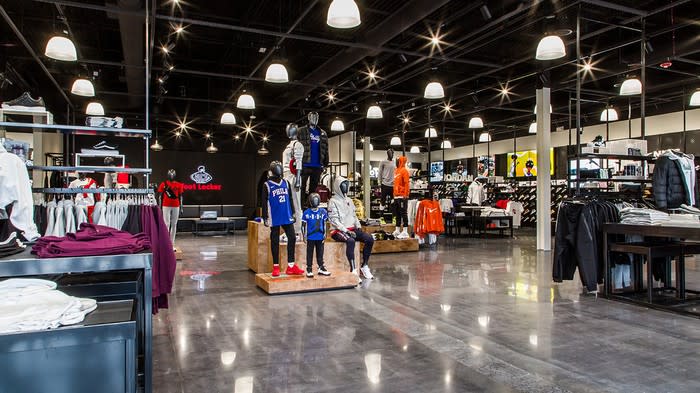3 Retail High-Yield Dividend Stocks Worth Buying
It's no secret that the internet has changed the way consumers shop. But that doesn't mean the physical store is dead -- on the contrary. According to the U.S. Census Bureau, only 14% of retail sales were done online so far in 2019. While not posting growth figures as robust as the double-digit expansion numbers of online-only stores, the old guard is adapting to the evolving landscape and is in better shape than the news would have us believe.
But the negativity means there are some bargains out there, and many physical retail businesses are yielding big dividend payouts, including Foot Locker (NYSE: FL), Macy's (NYSE: M), and Store Capital (NYSE: STOR).

In 2019, Foot Locker opened its first Power Store in North America at a location in suburban Detroit. Image Source: Foot Locker
1. Foot Locker: Sneaker culture isn't going anywhere
Due to the enduring popularity of sports apparel, Foot Locker has been one of the better-performing specialty stores over the last few years, increasing sales some 10% during the last five-year stretch. Where other brick-and-mortar stores have faltered or flopped completely, comparable-store sales (a combination of foot traffic and customer ticket size) and revenue at this shoe chain have continued to rise.
Investors have been unhappy as of late, though. Comps so far this year have come in far lower than anticipated, posting a meager 0.8% increase in the 2019 second quarter. Management had been calling for a mid-single-digit rise for the full-year, so worry has cropped up that competition -- most notably from shoemakers themselves and their own direct-to-consumer selling models -- could be taking a bite out of Foot Locker's business. Tariffs on apparel coming out of China could also dent profit margins.
Foot Locker is no slouch, though, and maintained its positive outlook for 2019. Optimism was supported by the fact that foot traffic was sluggish during the spring, but steadily improved through the summer months. Plus the company's online store continues to do well, and now makes up over 14% of total revenue. Not bad for a chain that has over 4,000 physical stores worldwide. Shares currently trade for a mere 7.7 times last year's earnings, and the current dividend yield of 4.3% is easily covered by free cash flow. Add in a share repurchase program, and Foot Locker looks like a solid bet within the retail industry.

A Macy's storefront in Atlanta. Image Source: Macy's
2. Macy's: Department stores under duress
Department store chain Macy's looks like a shell of its former iconic self. Though revenue is down only 11% over the last five years, share prices have been plummeting and are down 50% this year alone amid falling sales, smaller profit margins, and a rebound strategy that has yet to inspire investor confidence.
Looking on the bright side, comps at existing stores did increase for the seventh quarter in a row during the second quarter of 2019 (although revenue fell 0.5% due to under-performing store closures). That at least provides some measure of hope that Macy's flagship locations are still winners with consumers. However, it was a meager comps increase of just 0.3%, and inventory surplus and an inefficient online selling model tanked the bottom line. Adjusted earnings per share are down 39% through the first half of 2019 compared to a year ago.
Many investors are summing up the situation as bleak, but that could be a mistake. Don't get me wrong, Macy's will be a very bumpy ride. But it is updating its in-store experience with off-price discounting and taking a cue from online outfitters and offering a high-end subscription clothing service. The store also recently signed a cloud-based management deal with Google parent Alphabet to help it manage its inventory and distribution. Investments such as these take time to pay off, and in the meantime, the sour shareholder mood has Macy's shares trading for just 4.5 times trailing 12-month earnings.
The dividend is also yielding a hefty 10.6% as of this writing -- though that benefit has come under some fire, as some think Macy's would be better off cutting down the stockholder paydays and investing the funds in more transformation. No word on whether that will happen, but in the meantime, it's a nice bonus while investors wait for a turnaround to take hold.

Image source: Getty Images.
3. Store Capital: Retail real estate that's winning
With the retail apocalypse contributing to many a store closure, commercial real estate might seem like a bad place to be right now. But not all commercial property management companies are created equal. On the contrary, many are fast-growing endeavors. Enter Store Capital, which has nearly doubled in value since its public debut back in 2014 and is one of Warren Buffett's holdings.
That alone is no reason to buy. But what actually sets Store Capital apart is its target tenants and property type. Store Capital focuses on single-tenant buildings (versus malls and shopping centers), looks for long-term contracts of about 15 years or more (the average new-term length was 18 years during the second quarter), and looks for businesses where internet disruption is minimal. That means operations like gyms, restaurants, and other service-driven retail. Speaking to the power of the real estate portfolio, Store Capital had a 99.7% occupancy rate across its more than 2,400 properties, unchanged from the occupancy rate in the same period a year ago.
Adjusted funds from operations per share growth (from which dividend checks are cut) increased 10% through the first half of 2019, driven by a 25% increase in revenue as Store continued to wheel-and-deal and grow its portfolio. With that metric steadily on the rise and the retailer real estate company not raising its payout for a year now, management said it will be evaluating a dividend bump for shareholders during the third quarter of 2019. Right now, the annual yield sits at 3.6%. Not too shabby given the wanton retail destruction the talking heads would have us believe is going on out there.
Expect turbulence and exercise due diligence
Retail is evolving for the 21st century, but there are plenty of old brick-and-mortar stores that will survive and thrive. This list of dividend payers is not exhaustive, and some extra due diligence should be taken by investors before making a purchase. And please understand that the retail revolution will cause some turbulence for even the best-in-breed physical stores. Dividends paid from solid business operations will help soften the blows, though, and can help create investor wealth over the long-haul.
More From The Motley Fool
Suzanne Frey, an executive at Alphabet, is a member of The Motley Fool's board of directors. Nicholas Rossolillo and his clients own shares of Alphabet (C shares) and Foot Locker. The Motley Fool owns shares of and recommends Alphabet (A shares), Alphabet (C shares), and STORE Capital. The Motley Fool has a disclosure policy.
This article was originally published on Fool.com

 Yahoo Finance
Yahoo Finance 